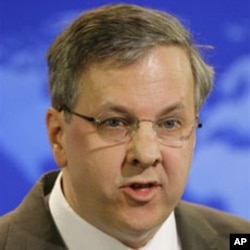The State Department says the diplomatic move by the tiny Pacific state has no practical meaning and that the vast majority of countries around the world continue to reject the notion of the two Georgian areas as independent.
Nauru, with only about 15 square kilometers of territory and 11,000 inhabitants, is considered the world's smallest republic. It has been experiencing lean economic times because of the depletion of its main resource - phosphate-rich bird droppings prized for fertilizer.
Its announcement on recognition followed a request to Moscow for large-scale economic help but it is unclear whether Russian aid will be forthcoming.
Only Venezuela and Nicaragua had extended recognition to Abkhazia and South Ossetia since Moscow began a diplomatic drive for such action after its brief 2008 war with Georgia.
At a news briefing, State Department Spokesman Ian Kelly said the addition of Nauru to the short list does nothing to affect the political equation.
"The recognition by Nauru in and of itself does absolutely nothing in our eyes to help establish or underpin in some way the legitimacy of the de facto governments in both of those separatist regions," he said. "We continue to support, as [does] the absolute vast majority of countries around world the territorial integrity of Georgia. And that that means that we consider these entities as parts of Georgia."
Kelly urged all countries to support Georgia's territorial integrity and sovereignty and to respect multiple U.N. Security Council resolutions recognizing the breakaway regions as parts of Georgia.
He said Russia and Georgia should uphold commitments under the French-brokered cease-fire agreement that ended the 2008 conflict.
The Russian Foreign Ministry welcomed Tuesday's announcement by Nauru, saying it will boost the standing of the two entities and contribute to regional stability.
Earlier this week, the State Department expressed regret over the staging Saturday of a presidential election in Abkhazia won by the region's incumbent leader, Sergei Bagapsh.
Bagapsh was said to have won a second five-year term with about 60 percent of votes cast though his nearest rival, a former Russian security agent, alleged irregularities.
State Department spokesman Kelly said in a written statement Monday the United States recognizes neither the legality nor the results of the Abkhazia election. The Georgian government called the vote invalid.





